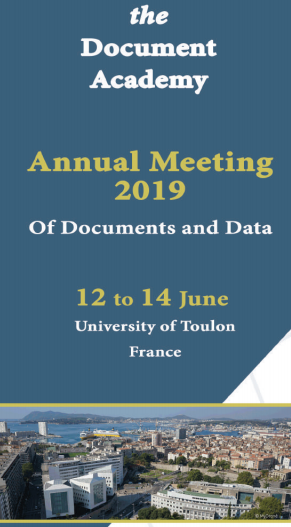Theme: Documents in the data era: From multimedia, to augmented, hyper, enriched, and fragmented... what else?
Conference co-chairs: Fidelia Ibekwe, Kiersten F. Latham and Michel Durampart
Keynote speakers:
Wayne de Fremery, School of Media, Arts, and Science, Sogang University, Seoul
Jonathan Furner, University of California, Los Angeles
Manuel Zacklad, Conservatoire National des Arts et des Métiers (CNAM-DICEN), Paris, France
Wayne de Fremery, School of Media, Arts, and Science, Sogang University, Seoul
Jonathan Furner, University of California, Los Angeles
Manuel Zacklad, Conservatoire National des Arts et des Métiers (CNAM-DICEN), Paris, France
|
Since the 1950s, the world has been witnessing an accelerated pace in the invention and dissemination Information and Communication Technologies (ICTs) (the Internet, the web, social media and mobile telecommunication) which have also accelerated the virtualisation of forms of documents. Each invention of ICTs has been accompanied by an ominous prognosis about the imminent demise of documents, still perceived by many as being only on hard copy materials and mostly made of texts. Yet, for knowledge and information to be useful to society (and not only to individuals), they need to be fixed on materials that can be shared. Documents are therefore the “tangible” or “informed” (as in “put into form”) manifestation of information and knowledge, whether it is in hard copy or in digital form, whether it is made up of a snippet of text as in tweets, a Facebook post, a birth or death record, an invoice of a transaction completed online, an email, a newspaper article, a video file posted online, or a podcast of a program.
The 2019 edition of DOCAM wishes to investigate the road that documents have travelled in the face of the increasing virtualisation of all its material media and in particular in the face of a world in the grip of data-ism. For ultimately, what are big data, if not a vast ensemble of documents? The theme of this year’s meeting invites exploration of the ways in which documents have resisted and evolved to espouse the form imposed by each “new ICT” by successively being “multi-media”, “hyper”, “augmented”, “enriched”, or “fragmented”. Indeed, the big data era places important documentary burdens on us all, since no one person can now mentally assimilate the abundant information necessary to accomplish a task. Big data therefore makes it even more imperative to be constantly surrounded by multimedia and multiformat “documents” that we constantly browse, while in repose, more often in movement, in order to accomplish a task (prepare a lecture, respond to a query, fill in a form online, write a research paper, simply to fill in gaps of knowledge on a favourite topic, etc). The 2019 edition of DOCAM seeks submissions pertaining to the situation of documents in the data and web era. Papers can deal with one of the following specific topics:
For conference program, click here. |

